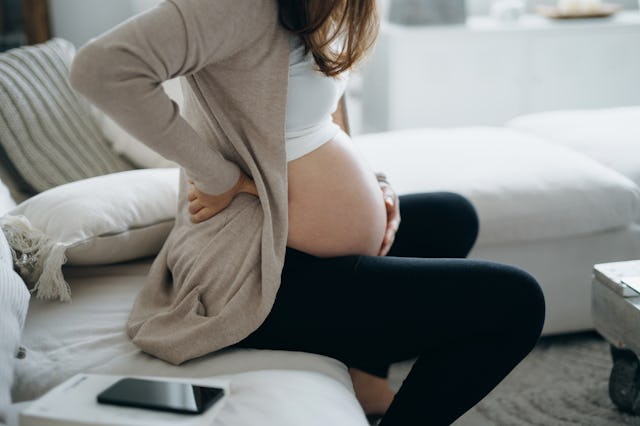Is Surgery The Only Way To Fix Pregnancy Hernias? You’ve Might Have Options
Your treatment plan depends on the severity of your hernia.

Pregnancy changes your belly in all sorts of ways, including making your innie belly button become an outie. And while that's a super cute look (who doesn't love it when the "turkey timer" pops?), it can also signify a pregnancy-related hernia.
A hernia occurs when a section of your intestine or other tissue pushes through a weakened layer of muscle, or a small hole, in your abdomen. You might be familiar with hernias as a gym-related incident (like lifting too heavy weights for your frame). However, hernias are prevalent in pregnant people due to the increased pressure put on the abdomen. If you have a hernia, you might see or feel a tiny bulge around your belly or groin area, as well as a dull achy feeling.
Luckily, most hernias are not cause for concern. Still, it's important to report any new pain or cause of concern with your medical doctor, whether you experience it during your pregnancy or the days after giving birth.
Risk Factors For Pregnancy-related Hernias
Anyone can develop a hernia, but the following factors can increase your risk of having one:
- Multiple pregnancies
- Expecting more than one baby
- Weight
- Older age
- Prior abdominal surgery
- Previous hernia
According to the American Pregnancy Association, pregnancy itself can make you more susceptible to hernias since our muscles tend to thin and weaken during pregnancy.
What to Know About Your Hernia
As strange as it sounds, some people with hernias during pregnancy exhibit no signs or symptoms. If you are symptomatic, you'll notice a bulge or lump appears around your abdominal area or groin when you lie down or press on it. You might also feel some pain in the area, which will intensify when you do certain movements, like bending over, sneezing, coughing, or lifting something heavy (which you shouldn't be doing while pregnant, if possible).
One of the most common hernias for pregnant women is an umbilical hernia, which affects your navel or belly button and causes your intestines to bulge through the front of the abdominal wall — not a great image, sorry!
The good news is if your hernia isn't painful or protruding too far, it can resolve itself without any risk to you or your baby. In fact, you might be able to push it back in. However, if you find the pain is increasing and too much to bear, you risk it becoming a strangulated hernia, which means it's trapped within your abdominal wall, causing the blood supply to the trapped tissue to be cut off.
Symptoms of a strangulated hernia include:
- Nausea
- Pain that worsens
- Vomiting
- Inability to pass gas or stool
How to Treat a Hernia During Pregnancy
There's no "one-size-fits-all" solution to treating a hernia during pregnancy. If the hernia isn't causing you much pain and doesn’t pose a threat to you or baby, your doctor will likely suggest treating it after giving birth. In the meantime, continue monitoring it and massage it back toward your stomach. And don't worry — your hernia won't affect your baby, who's nice and safe in your uterus.
If you've had a C-section before or the hernia is located on your lower belly, your doctor might recommend a C-section. They may even recommend treating the hernia at the same time as your C-section.
If you still have the hernia after giving birth, it’s possible your doctor will send you home with some exercises to help heal your abdominal muscles. But if the hernia still doesn’t resolve, surgery could be necessary. In fact, the American Pregnancy Association says it’s the recommended option for treating hernias post-partum: “Surgery is the only effective way to fix a hernia. The wall of the muscle must be surgically repaired to prevent the organ from coming through. However, it is recommended not to have this surgery during pregnancy, unless it is imposing a risk to you or baby. Otherwise, it should be delayed until after birth and after a full recovery, which can last between three and six months.”
If your hernia is causing you distress while pregnant, your doctor will want to repair it as soon as possible. Emergency surgery will be necessary if it becomes serious — like a strangulated hernia — although surgical intervention is still typically only recommended in the second trimester. But if your doctor feels it’s the right option for you and your baby, it’s best to err on the side of caution.
This article was originally published on